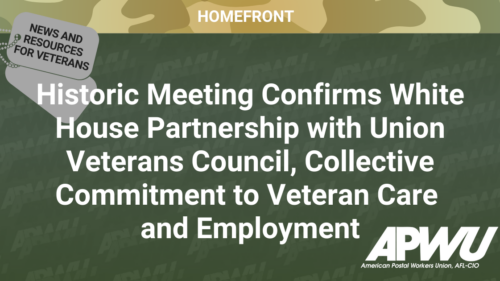
Historic Meeting Confirms White House Partnership With Union Veterans Council
August 26, 2024The APWU’s very own National Veterans, Guard, and Reservist Information Specialist (VGRIS) Robert “Bob” La Foe, represented the APWU veterans’ membership during the AFL-CIO’s Union Veterans Council meeting at the White House.
magazineHomefrontHomefront – Veterans Resources
The AFL-CIO’s Union Veterans Council (UVC) made history on July 9, 2024, by leading a large-scale delegation of union veteran workers to the White House. This historical event highlighted the critical role of union veterans in projects such as the bipartisan Infrastructure Investment and Jobs Act, made possible by the Biden administration’s pro-worker and pro-labor policies. The APWU’s very own National Veterans, Guard, and Reservist Information Specialist (VGRIS) Robert “Bob” La Foe, represented the APWU veterans’ membership at this historical White House Meeting.
Throughout the meeting, attendees had the opportunity to hear from multiple veterans’ organizations and agencies, while also engaging in direct dialogue with senior White House staff, including the U.S. Department of Veterans Affairs (VA) Secretary Denis McDonough, who admitted the VA healthcare system is seriously damaged and a work in progress to repair. He is humbly seeking the help of the UVC and other American veterans’ organizations in finding the solutions needed to correct the damage. These interactions demonstrated that the Biden-Harris administration is dedicated to addressing the needs and concerns of union veterans. More meetings were promised soon. Join us, it’s easy: unionveterans.org ■
Historic Meeting Confirms White House Partnership With Union Veterans CouncilCollective Commitment to Veteran Care and Employment0
Read More....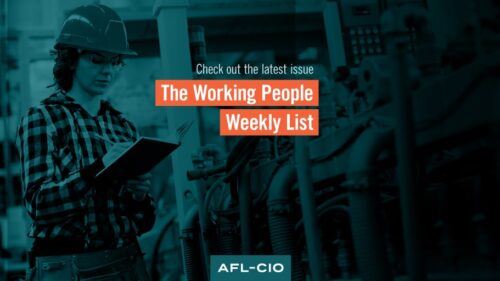
Saving Workers’ Lives and Limbs: The Working People Weekly List
Saving Workers’ Lives and Limbs: The Working People Weekly List
Every week, we bring you a roundup of the top news and commentary about issues and events important to working families. Here’s the latest edition of the Working People Weekly List.
Labor Leaders Stand Up, Show Out for Kamala at DNC: “The Democratic National Convention’s (DNC) nomination of Vice President Kamala Harris for president and Minnesota Gov. Tim Walz as the next vice president commenced with a wave of endorsements from the nation’s largest labor unions. On the very first night of the convention, an impressive gathering of union presidents took the stage. AFSCME’s Lee Saunders, SEIU (Service Employees International Union) President April Verrett, LIUNA (Laborer’s International Union of North America) President Brent Booker, Ken Cooper of the International Brotherhood of Electrical Workers (IBEW), Claude Cummings Jr. of the Communication Workers of America (CWA), and Liz Shuler of the AFL-CIO stood on stage together, they displayed the power of unions.”NWSL, Players Reach New CBA That Includes Elimination of Draft: “The National Women’s Soccer League and its players agreed to a new collective bargaining agreement that will grow salaries and further expand player rights regarding free agency and trades, the sides announced Thursday. The deal includes the elimination of the college draft, a first for a major North American professional sports league. The new CBA will extend the current contract, which was negotiated in 2022 and was set to expire in 2026, through 2030. Some of the new terms, such as the elimination of the draft and free agency for all players when their contracts expire, will go into effect immediately; others will begin in 2025.”How Tim Walz Saved Workers’ Lives and Limbs: “In 2023, with a narrow Democratic majority and working closely with the Minnesota AFL-CIO, the state legislature passed several innovative laws that greatly strengthen the safety and health protections provided to Minnesota workers employed in high-hazard jobs. These include: Protecting Workers from Ergonomic Hazards: About 30% of all serious injuries reported by employers to the Bureau of Labor Statistics are musculoskeletal disorders (MSDs). These are injuries to the back, wrist, neck, or arm caused by exposure to lifting, twisting, repetitive motions, and other ergonomic hazards.”Union Leaders at DNC Push Back Against Trump Overtures to Organized Labor: “Vice President Kamala Harris’ campaign is highlighting its pro-union stance at the Democratic National Convention this week, pushing back against Republican Party overtures to organized labor at their own convention last month. It’s an attempt to refute former President Donald Trump’s claims that he will work with organized labor amid recent meetings with the president of the Teamsters union, and an effort by Harris to hitch onto President Joe Biden’s labor record, which includes being the first president to walk a picket line. Addressing the Wisconsin delegation to the DNC Wednesday morning, U.S. Acting Secretary of Labor Julie Su argued Harris had fought wage theft as attorney general of California, and would enact worker-friendly policies as president.”Venetian Las Vegas Reaches Tentative Deal with Workers for First Union Contract: “The Venetian Resort has agreed to its first union contract with more than 4,000 hospitality workers. The Culinary Union announced that a tentative agreement was reached Tuesday morning for workers at The Venetian and Palazzo. A contract ratification vote will be scheduled soon, according to a union spokesperson. Culinary and Venetian leadership reached an agreement in June last year for ‘card check neutrality.’ That meant the resort would not take a position as employees explored possible unionization.”University of Alaska and Graduate Student Union Reach Three-Year Contract: “A new Collective Bargaining Agreement (CBA) between the University of Alaska and the Alaska Graduate Workers Association-UAW Union (AGWA-UAW) took effect on July 1. This is the first time the University of Alaska and AGWA have negotiated a CBA. The agreement comes less than a year after University of Alaska graduate student employees voted to form a union.”Union Leaders Frame Harris as Champion of the Working Class in Night 1 of DNC: “Union leaders championed Vice President Kamala Harris as the choice for working class folks in a series of speeches on the opening night of the Democratic National Convention. ‘This election is about two economic visions,’ said Liz Shuler, president of the American Federation of Labor and Congress of Industrial Organizations, or AFL-CIO. Her union represents nearly 13 million American workers, she said.”Kamala Harris Names a Unionist as Her VP: “Just hours after Vice President Kamala Harris named Tim Walz as her running mate Aug. 6, AFL-CIO president Liz Shuler celebrated the pick in a press statement, calling Walz a ‘principled fighter and labor champion’ who’s not just an ally but a union brother. Walz is a former public high school teacher and football coach who has been Minnesota’s governor since 2019. As governor, he signed lots of pro-worker legislation, including: Paid family and medical leave and mandated paid sick days; A ban on noncompete clauses; A ban on employers from holding mandatory anti-union meetings; Letting teachers unions bargain over class size; and $2.6 billion in infrastructure investments.”The Rev. Barber: Kamala Harris Isn’t Just Listening to Workers. She’s Sounding Like Them: “With its rallies that pack arenas, Vice President Kamala Harris’ presidential campaign has harnessed an energy that many have compared to Barack Obama’s 2008 campaign. Polls in battleground states indicate that the dynamics of the presidential race have fundamentally shifted, but skeptics question if the good vibes can last once the vice president starts to detail policy. Is this burst of excitement, they ask, just the momentary enthusiasm of voters surprised by an unexpected transition? When we pay attention to what Harris and Walz have already said, though, it’s clear they have tapped the energy of worker-driven movements that want to create an economy that works for all of us. The good vibes and the economic vision of this campaign are, in fact, deeply connected.”
Kenneth Quinnell
Mon, 08/26/2024 – 12:04
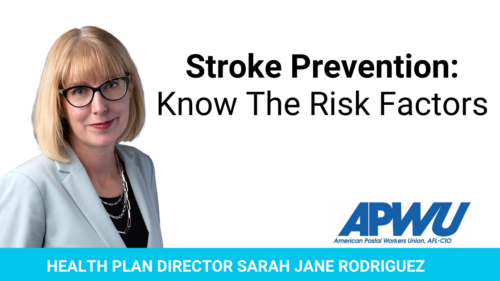
Stroke Prevention: Know the Risk Factors
August 26, 2024APWU Health Plan Director Sarah J. Rodriguez shares Stroke Prevention and Risk Factors from the United Healthcare network, including how to spot a stroke using the F.A.S.T. warning signs.
magazineHealth PlanSarah Jane Rodriguez
The UnitedHealthcare network is the provider for the APWU Health Plan. Below are some tips shared in its Let’s Move newsletter to help you stay informed and empowered about your health care.
Know the Risk Factors
Stroke is the fifth-leading cause of death and the leading cause of disability in America. Knowing the risk factors you can control may help prevent stroke from happening to you or a loved one. Help reduce your risk of stroke by having regular checkups and following treatment plans such as taking prescription medications as prescribed, getting regular physical activity, and following a healthy diet. You may not be able to control all of your risk factors, so try to stay focused on the ones you may have some control over.
F.A.S.T. Warning Signs2
By seeking immediate treatment, stroke patients may have higher survival rates and lower disability rates. Making the call to 911 allows first responders to begin treatment before the patient arrives at the hospital. Use the letters in F.A.S.T. to help identify a stroke.
F = Face Drooping
Typically noticeable on one side of the face with visible drooping or numbness. A person’s smile appears uneven.
A = Arm Weakness
When the arms are lifted overhead, one arm drifts downward due to weakness or numbness.
S = Speech Difficulty
Speech is slurred or nonsensical.
T = Time to call 911
A stroke is an emergency. Every minute counts to get the best care, making it important to note the time when symptoms are first noticed or experienced. ■
Risk Factors You May Control and Treat Include:
High blood pressure;
Smoking;
Physical inactivity;
Diabetes;
Diet;
Obesity;
High blood cholesterol;
Carotid artery disease;
Peripheral artery disease;
Atrial fibrillation;
Other coronary disease (heart failure, heart valve disease, congenital heart defects, or enlarged heart);
Sickle cell disease.
Other risk factors you may not control include: age, family history, race, gender, prior stroke, transient ischemic attack (TIA) or heart attack.1
1 American Stroke Association, https://www.stroke.org/en/about-stroke/stroke-riskfactors
2 American Stroke Association, https://www.stroke.org/en/about-stroke/stroke-symptoms
This communication is going to eligible members and is not intended to imply the recipient has a specific condition or disease.
This information is for educational purposes only and is not a substitute for the advice of a doctor. Consult your doctor prior to beginning an exercise program or making changes to your lifestyle or health care routine. © 2024 United HealthCare Services, Inc. All Rights Reserved.
Stroke Prevention: Know the Risk Factors0
Read More....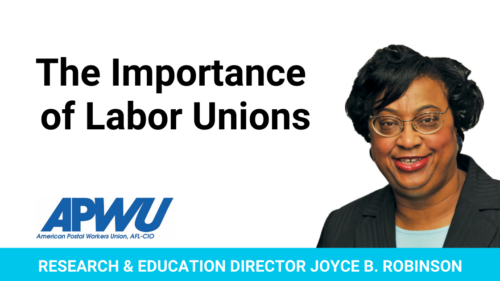
The Importance of Labor Unions
August 26, 2024Research & Education Director Joyce B. Robinson highlights the importance of labor unions, and its positive impacts across the workplace for all demographic groups.
magazineResearch and EducationJoyce B. Robinson
Today, many workers are joining or want to join labor unions. But many employers fight workers’ efforts to organize a union in their workplaces by intimidating, harassing, or threatening them. Workers reap substantial benefits from unionization. Unions raise the wages of their members by 10 to 15 percent. Among full-time wage and salary workers, union members had median weekly earnings of $1,263 in 2023, while nonunion workers had median usual weekly earnings of $1,090. Unions also improve fringe benefits and workplace procedures, such as retirement plans, workplace grievance policies, and predictable scheduling. These workplace improvements contribute substantially to middle-class financial stability and workers’ well-being.
Selected Characteristics of Union Members
According to the Bureau of Labor Statistics, in 2023, the unionization rate for women was 6.6 million (9.5 percent). For men it was 7.8 million (10.5 percent). Among the ethnicity groups, Black workers continued to have a higher union membership rate, (11.8 percent) than white workers (9.8 percent), Asian workers (7.8 percent), and Latino workers (9.0 percent). By age, workers ages 45 to 54 had the highest union membership rate, at (12.6 percent). Younger workers, ages 16 to 24, had the lowest union membership rate, at (4.4 percent). The union membership rate for full-time workers (10.9 percent) was more than double that for part-time workers (5.2 percent).
Union Membership by State
In 2023, 31 states and the District of Columbia had union membership rates below the U.S. average (10.0 percent), while 19 states had rates above it. Eleven states had union membership rates below 5.0 percent. South Carolina had the lowest rate (2.3 percent). The next lowest rates were in North Carolina and South Dakota (2.7 percent and 3.6 percent, respectively). Two states had union membership rates over 20.0 percent: Hawaii (24.1 percent) and New York (20.6 percent).
Health Care for Unionized Workers
In a study by the National Library of Medicine, union workers are more likely to have health insurance coverage, are more likely to have a regular care provider, and have a lower share of out-of-pocket costs than nonunion workers. Union workers are approximately 10 percent more likely to have health insurance coverage, 6.8 percent more likely to have a regular care provider, visit office-based providers 31 percent more often than non-union workers, and have an out-of-pocket expenditure share approximately 11 percentage points lower than non-union workers.
Unions Importance to the Economy
On Aug. 28, 2023, the U.S. Treasury Department issued a Fact Sheet on the role that labor unions play in the American economy, stating:
“Unions help create a fairer economy by benefiting all demographic groups. By encouraging egalitarian wage practices, unions serve to reduce race and gender wage gaps. The diverse demographics of modern union membership mean that the benefits of any policy that strengthens today’s unions would be felt across the population. In addition to supporting the middle class, unions contribute to economic growth and resilience.” In closing, unions have made life better for all working people by helping to pass laws ending child labor, establishing the eight-hour workday, protecting workers’ safety and health, and helping to create a Social Security network, unemployment insurance, and establish the minimum wage. ■
Sources: U.S. Department of Labor, Bureau of Labor Statistics, Union Members in 2023, U.S. Department of Treasury Fact Sheet, August 28, 2023, and National Library of Medicine.
The Importance of Labor Unions0
Read More....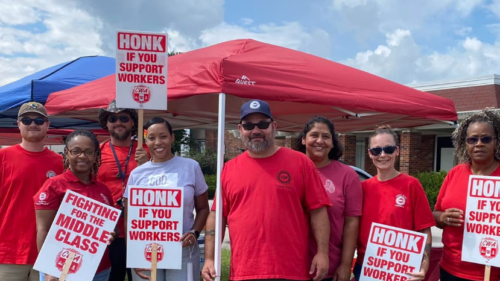
Service & Solidarity Alert: 17,000 AT&T Southeast Workers on Strike
Service & Solidarity Alert: 17,000 AT&T Southeast Workers on Strike
Working people across the United States regularly step up to help out our friends, neighbors and communities during these trying times. In our Service & Solidarity Spotlight series, we’ll showcase one of these stories every day. Here’s today’s story.
We are CWA members on strike at AT&T Southeast because AT&T is refusing to engage in good faith negotiations for a new contract.We are a big part of AT&T’s success, but we have been at the bargaining table since June, unable to make any progress because of the Company’s bad faith bargaining.The National Labor Relations Act requires companies to bargain in good faith. We have filed an unfair labor practice charge against the company and are on strike to protest the Company’s unfair bargaining tactics. We want to be on the job, providing the quality service that our customers deserve and getting to work making sure every household and business in the Southeast has reliable high-speed internet service.Tell AT&T to show us the respect we deserve and get serious about bargaining.
Kenneth Quinnell
Mon, 08/26/2024 – 10:22
Tags:
Organizing
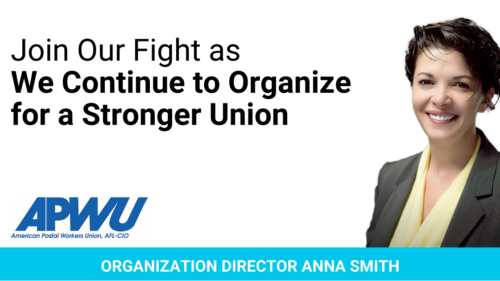
Join Our Fight as We Continue to Organize for a Stronger Union
August 26, 2024Organization Director Anna Smith highlights the top locals in several categories who increased their membership percentage during the Building Union Power organizing drive.
magazineOrganizationAnna Smith
Having a conversation with a nonmember coworker can be downright intimidating. Because of this intimidation, some find it frightening and daunting to ask them to stand with us. We have fought for the precious right to organize a union in our workplace. The fact is these nonmembers are working against our best interests. Some are loud and confrontational with anti-union rhetoric. They let everyone know just why they are not a member. While we are all paying attention and realizing the harm done by the boisterous one, the silent nonmember is as destructive, if not more.
They are silently working against everything we fight to achieve. The nonmember might try to say, “It’s not personal, I just [insert excuse here].” Do not drink the Kool-Aid; let them know it is absolutely personal! Every nonmember stands against our fight for a livable wage, health care for our families, and the benefits we enjoy.
There isn’t a neutral line. Don’t assume every coworker is a member. Workers in facilities where 100 percent of the workers are union members know that they are, and quite frankly, management knows this too. If your office is not 100 percent organized, now is a great time to remind the nonmembers they are working in a union environment, with pay and benefits that are only achieved by being union. There is no harm in asking your coworker next to you if they stand with you as a union member. You will either share common ground from that point forward or know that they are working against you. There is, however, injury in not inquiring.
Each year, at every level, leaders continue to put more effort into organizing. While some continue to push to be at the top in their category, there are some new additions to the list. During APWU National Conventions, there are some friendly challenges between locals to see who can improve the most. Awards are given to locals at the top of the game come National Convention time, and leading up to the convention it is always exciting to see the friendly, but serious, challenges between locals. This year was unique, as we were in the midst of an all-out organizing drive. However, due to production time, awards had to be completed before the conclusion of the drive. I would be remiss if did not point out that every local on this list increased their organizing percentage by the conclusion of the drive. Congratulations and thank you for all your hard work!
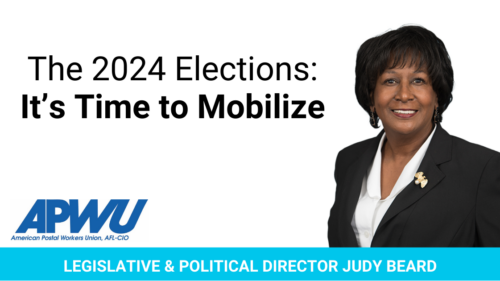
The 2024 Elections: It’s Time to Mobilize
August 26, 2024Legislative Director Judy Beard urges members to get involved this election season, check their voter registration, and make a plan to vote.
magazineLegislative and PoliticalJudy Beard
You have probably heard that democracy is on the ballot this November in the 2024 elections. Many of you may wonder what exactly this means. Put simply, the outcomes of the upcoming elections will determine the future of our nation, our jobs, and our lives. We will have choices to make up and down the ballot. Are we looking to expand rights and freedoms for all Americans, or place limitations? Are we looking to unite through truth and honesty, or divide through lies and deceit? Are we looking to go forward into a future marked by progress and hope, or one marked by hatred and despair, where the top one percent get richer, leaving the rest of us behind? These are the questions we must ask ourselves as we go to mark our ballots this election season.
It is absolutely critical that we vote not only in the presidential election at the top of the ticket, but all the way down the ballot. Governors, state legislatures, city councils, school boards, local judges, police chiefs, and more all shape the policies that govern your life. Some states and localities have various ballot initiatives and referenda to vote on, which allow you to have a direct say in policy. Decisions at the state and local level can affect you and your family’s lives just as much as federal elections. So, remember to vote on these ballot measures and in these elections as well!
Remember that your vote is your voice. These elections will be decided, in large part, by the nearly half of eligible voters who do not exercise their most fundamental right in our democracy. This right was not given to us, it was fought for and won through years of struggle. That is why we must all encourage our family, friends, and community to mobilize around building a better future this November. In order to do this, we need to educate everyone about what’s at stake and how to make our voices heard. Here is a checklist to ensure nothing is missed when making your plan to vote:
Determine your method of voting: early, absentee, by-mail, in-person
Locate your polling place
Get a ride to the polls
Schedule a time to vote
Check potential ID requirements
Check who is on your ballot
Volunteer to be a poll worker
Please visit our website at apwu.org/2024-elections to hear from your fellow APWU members on the importance of voting and checking your voter registration status. On that page you will also find links to help you make your plan to vote, find your current representatives, and much more. If you have any questions about how to make your plan to vote this November, please feel free to contact the Legislative and Political Department by email at legislative@apwu.org or phone at 202-842-4211. We are a resource to help every single APWU member, as well as their family and friends, exercise their hard-fought right to vote this November!
The 2024 Elections: It’s Time to Mobilize0
Read More....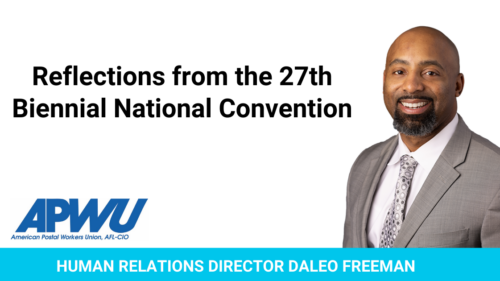
Reflections from the 27th Biennial National Convention
August 26, 2024Human Relations Director Daleo Freeman shares takeaways from the 27th Biennial National Convention, and more of what’s to come from the Human Relations Department.
magazineHuman RelationsDaleo Freeman
Defined Progress
The APWU Constitution and Bylaws mandates the Human Relations Department’s role in fostering equal opportunity, community service, and supporting our members in various capacities. We stand on the shoulders of excellent leaders who championed our causes. Their legacy propels us forward as we continue to uphold these principles. The Pre-Convention Workshops and the National Convention were a major success, as delegates from across the country descended upon Detroit to attend over a week’s worth of great training and spirited debates about all sorts of issues from the protection of our constitutional rights to the continued solidarity for all in the labor movement. It was an honor to participate and witness a momentous event that will shape and mold the future of our union for years to come. Thanks to everyone that attended. We hope that everyone has returned to their respective area that much more energized, mobilized, and organized than ever before.
Staying In Motion
In the spirit of progress, the Human Relations Department remains committed to staying in motion. Communication is key as we work to address members’ needs across the nation. We’re expanding our reach with a network of local and state Human Relations representatives, ensuring that support is accessible wherever it’s needed. By leveraging resources and knowledge, we empower our members and strengthen our collective resolve.
We extend our heartfelt gratitude to our dedicated Regional Resource Assistants (RRAs) for their unwavering commitment and tireless efforts in completing training programs related to the Office of Workers’ Compensation Programs (OWCP) and on-the-job injuries. Their expertise and dedication equip them with the knowledge and tools needed to provide invaluable support to locals nationwide, ensuring proper advice and effective assistance to workers within the APWU family. Through formal training and certification processes provided by the Department of Labor (DOL), our RRAs stand ready to deliver comprehensive training and guidance on these critical issues. We are immensely grateful for their invaluable contributions to our union’s mission and vision. For a listing of our current RRAs please visit, apwu.org/regional-resource-assistants.
Coalitions Are Key
Another key to our success lies in building and fortifying coalitions. By uniting with diverse interest groups, we amplify our impact and advocate for meaningful change. Please visit, apwu.org/coalitions to learn more about our coalitions.
Furthermore, the Human Relations Department has demonstrated a steadfast commitment to advocating for human rights by attending monthly meetings and partnering with the Civil, Human and Women’s Rights Director (CHWR Director) at the AFL-CIO and affiliate union directors focusing on civil and human rights. These meetings serve as a platform for discussing and advancing crucial issues related to human rights, ensuring that our union remains at the forefront of advocacy efforts. Through collaboration and dialogue, we continue to amplify our collective voice in support of equality, justice, and dignity for all.
We extend our deepest gratitude to Robert La Foe, our dedicated Veteran Guard and Reserve Information Specialist (VGRIS), for his unwavering advocacy and steadfast support of veteran benefits and awareness within our union. Robert’s tireless efforts ensure that our veteran members receive the recognition, support, and benefits they rightfully deserve for their service to our country. His commitment to raising awareness and championing the rights of veterans embodies the spirit of solidarity and inclusivity within the APWU family. We are profoundly grateful for Robert’s leadership and dedication to serving those who have served us all. Please join our veteran coalition efforts by logging into your Member Profile and adding your veteran designation and the branch you served to stay connected to important veteran news and benefits.
Together, we address common concerns and demonstrate the integral role of the labor movement in everyday life. Through collaboration, we harness the strength of solidarity and advance our shared goals. ■
Reflections from the 27th Biennial National Convention0
Read More....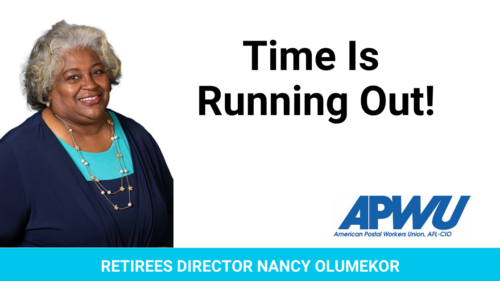
Time is Running Out!
August 27, 2024Enrollment Period (SEP), which waives the late-fee penalty for current Medicare Part A USPS annuitants to also enroll in Medicare Part B. The deadline to apply during the SEP is September 30, 2024.
magazineRetireesNancy Olumekor
Postal Service Health Benefits Program Medicare Part B Special Enrollment Period
As a result of the Postal Service Reform Act of 2022, a Medicare Part B Special Enrollment Period (SEP) began on April 1, 2024, and ends Sept. 30, 2024. This SEP gives USPS annuitants and their covered family members who are entitled to Medicare Part A, but are not currently enrolled in Medicare Part B, a one-time opportunity to enroll in Medicare Part B without incurring the Late Enroll Penalty (LEP).
Eligible annuitants and their covered family members should have received a special mailing from the USPS that includes an Eligibility Notice for Medicare Part B SEP, an Application for Enrollment in Medicare Part B, and a special Business Reply Envelope to return the required forms to a special PO Box. Enrollment in Medicare Part B during this SEP is optional. If you enroll in Medicare during this SEP, your Medicare Part B coverage effective date will be Jan. 1, 2025.
lf you are enrolled in Medicare Part B as of Jan. 1, 2025, you and any Medicare-eligible family members covered by your Postal Service Health Benefits (PSHB) enrollment must remain enrolled in Part B to remain eligible for PSHB coverage.
Medicare Part B has a monthly income-based premium for all who enroll. The 2024 Medicare Part B premium is $174.90 per eligible family member, based on an income of less than or equal to $103,000 filing single tax return ($206,000 joint filing).
If you enroll in Medicare Part B, you will need to pay monthly Medicare Part B premiums. The premiums are usually taken out of your monthly Social Security or Office of Personnel Management annuity payment. lf you do not receive any of these payments, Medicare will send you a quarterly bill for your Medicare Part B premiums. Go to medicare.gov/basics/costs for more information on Medicare Part B premiums. Certain Medicare Part B enrollees will pay higher premiums based on higher income.
If you did not receive the SEP packet in the mail and you believe you are eligible to enroll in Medicare Part B during this SEP; or you have questions about Medicare Part B or the PSHB program, call the Postal Service at 1-833-712-7742 or send an email to retirementbenefits@usps.gov.
Requests to Terminate Part B Coverage
If you enroll in Part B during this SEP and later decide that you do not want or need the Medicare Part B coverage, you can request a termination from the Social Security Administration prior to the effective date, Jan. 1, 2025.
lf your termination request is made before Jan. 1, 2025, you will not owe any Part B premiums and you will maintain your eligibility for PSHB coverage. lf your request is made after Jan. 1, 2025, you will no longer be eligible for the PSHB Program unless a Medicare Part B exception applies. You will also be responsible for any Part B and PSHB premiums due through the month of termination. If you have questions regarding termination of Part B or if you would like to terminate your Part B enrollment, call Social Security at 1-800- 772-1213. TTY users call 1-800-325-0778.
Election Matters
APWU Family – our way of life, our families, our communities, our health, and our future are under attack. As union and community activists, as people of goodwill who have worked long and hard to build this country, we must do everything within our powers to make sure our families, our neighbors, our friends, and our coworkers participate in Vote-by-Mail or vote in person in November 2024 to make sure that Kamala Harris is elected President of the United States. We can’t just stop with Kamala; we must also elect officials up and down the ballot who will support our issues! ■
Time is Running Out!0
Read More....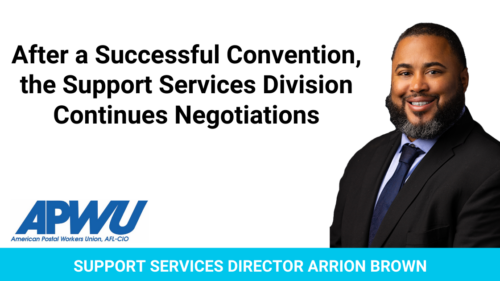
After a Successful Convention, the Support Services Division Continues Negotiations
August 27, 2024“Your contract campaign actions, in concert with the negotiations, will show postal management that our union negotiators truly express the will of the workers.” – Support Services Director Arrion Brown
magazineSupport Services DivisionArrion Brown
We recently completed the APWU’s 27th Biennial National Convention in Detroit, MI. The convention was a productive gathering of union spirit and solidarity that will allow us to energize, mobilize, and organize the APWU and the labor movement. Our National Convention is the highest-ranking authority of our union, and the decisions made by our convention delegates will guide our future and define our union’s identity.
The APWU is, has been, and always will be, a union that fights for better conditions for postal workers and all working people. From the 1970 postal strike, when our forebearers’ work stoppage against poor wages and working conditions resulted in a victory that created our union, until modern times when the APWU demanded that the Postal Service prioritize election mail during the pandemic to ensure that we preserve our democracy, the APWU has always stood for what is right and just. The delegates of our convention used these powerful examples of union strength from our history as a guide to make resolution decisions for our future.
Although the Convention was held in July, the process for locals and state affiliates to submit resolutions for consideration began much earlier. The resolutions are submitted to National for review by a screening committee. The screening committee consists of APWU members appointed by the APWU President. They decide which committee the submitted resolutions will be referred to for consideration.
The additional committees are Labor-Management, Constitution, Formal, Health and Safety, Clerk Division, Maintenance Division, Motor Vehicle Division, Support Services Division and Legislative. Each of these committees’ members are selected from the membership. The committees’ job is to review each resolution from the screening committee and make a recommendation to the convention delegates to either adopt, reject, or refer the resolution.
The convention delegates are decided by each local and state APWU affiliate. The delegates vote on the resolutions after the respective committee presentation, and delegates have an opportunity to speak on the resolution from a microphone in favor of or against resolutions. Delegates may also make changes called amendments to the resolution if the convention delegates vote in favor of amending the resolution. The resolutions can cause spirited and passionate debate prior to the final vote, but once the vote is complete, a decision has been made and we move to the next resolution. The APWU Convention is one of the finest examples of union democracy in the labor movement. We should all be proud that we have a process for our voices to be heard by our delegate representatives.
Now that the convention has concluded, the National Negotiating Committee will continue contract negotiations for the main collective bargaining agreement (CBA) that covers the majority of APWU members. The membership will play a key role in determining how much strength we have at the bargaining table. Your contract campaign actions, in concert with the negotiations, will show postal management that our union negotiators truly express the will of the workers. Contract campaigns are influential at the bargaining table and are great ways to build union solidarity among members.
In addition to negotiating the main contract, the Support Services Division is also currently negotiating several supplemental agreements for private-sector bargaining units. We will also begin to negotiate for the second Human Resources Shared Service Center (HRSSC) Contract on Aug. 29 in Greensboro, NC. As with all contract negotiations, the members have and will be a key force in achieving our goals to improve wages, benefits, and working conditions. The communication between the bargaining unit and the negotiators drives our bargaining goals, while the actions our members take gives us the leverage to make our goals achievable. ■
After a Successful Convention, the Support Services Division Continues Negotiations0
Read More....